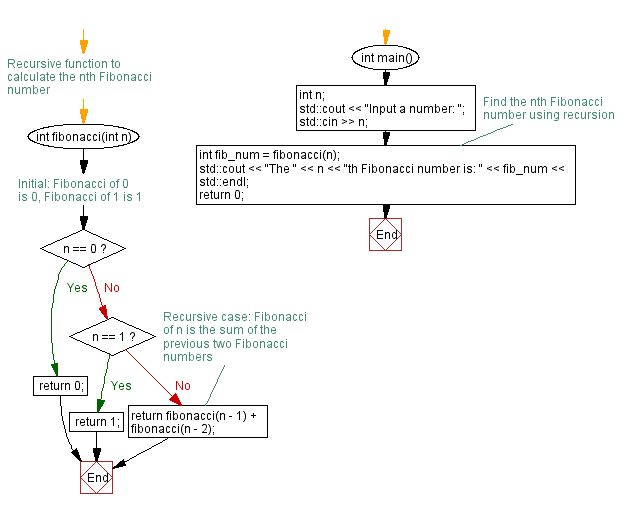C++ Recursion: Implementing recursive function for fibonacci numbers
3. Recursive nth Fibonacci Number
Write a C++ program to implement a recursive function to get the nth Fibonacci number.
In mathematics, the Fibonacci sequence is a sequence in which each number is the sum of the two preceding ones. Numbers that are part of the Fibonacci sequence are known as Fibonacci numbers. Starting from 0 and 1, the first few values in the sequence are: 0, 1, 1, 2, 3, 5, 8, 13, 21, 34, 55, 89, 144.
Sample Solution:
C Code:
// Recursive function to calculate the nth Fibonacci number
#include <iostream> // Including the Input/Output Stream Library
int fibonacci(int n) {
// Initial: Fibonacci of 0 is 0, Fibonacci of 1 is 1
if (n == 0)
return 0;
else if (n == 1)
return 1;
// Recursive case: Fibonacci of n is the sum of the previous two Fibonacci numbers
return fibonacci(n - 1) + fibonacci(n - 2);
}
int main() {
int n;
std::cout << "Input a number: "; // Prompting the user to input a number
std::cin >> n; // Reading the input number from the user
// Find the nth Fibonacci number using recursion
int fib_num = fibonacci(n); // Calling the recursive function to calculate Fibonacci number
std::cout << "The " << n << "th Fibonacci number is: " << fib_num << std::endl; // Displaying the Fibonacci number
return 0; // Returning 0 to indicate successful execution of the program
}
Sample Output:
Input a number: 1 The 1th Fibonacci number is: 1
Input a number: 9 The 9th Fibonacci number is: 34
Input a number: 14 The 14th Fibonacci number is: 377
Input a number: 19 The 19th Fibonacci number is: 4181
Flowchart:

For more Practice: Solve these Related Problems:
- Write a C++ program to compute the nth Fibonacci number recursively using memoization to avoid redundant calculations.
- Write a C++ program that implements a recursive function to return the nth Fibonacci number and prints the recursion tree depth.
- Write a C++ program to calculate Fibonacci numbers recursively and compare the execution time with an iterative solution.
- Write a C++ program that uses recursion to generate the Fibonacci sequence up to the nth term and then displays the sequence in reverse.
Go to:
PREV : Factorial Using Recursion.
NEXT : Sum of Digits Using Recursion .
CPP Code Editor:
Contribute your code and comments through Disqus.
What is the difficulty level of this exercise?
